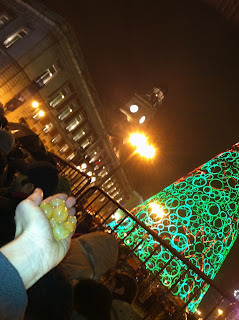July 28, 2010 - Yangshuo, Guangxi, China
~unknown
I'm not liking Yangshuo. After waking for the third morning among peaceful rice terraces, surrounded by lush green fields, chirping birds, and farm roosters announcing the suns presence, I boarded an expensive ($10 U.S.) bus and headed south to Yangshuo. The entire trip, including one change of bus, took three hours. Lonely Planet warns traveler that local taxis and rickshaws will drive aimlessly in the wrong direction to hike up costs and then arrive at a different hotel then requested in hopes of getting a kick-back from the hotel owner. This description describes my first two hours in Yangshuo. However, I'm pretty sure my rickshaw driver truly had no idea where she was going.
Having semi-verbal confrontations with the first two hotels visited, I left the driver behind to walk the vendor filled streets aimlessly. Finally arriving at a hotel that felt relatively safe and located right on the Li River, I paid more than desired to just relax. Actually, it was the French-style cafe next door, also overlooking the Li River, that was the real selling point. The Chinese barista, who speaks French and loves Johnny Cash, talked me into the cinnamon waffles with bananas and ice cream.
 Regardless of the crazy, exploiting locals, Yangshuo is incredibly beautiful. With surrounding limestone karst peaks and the Li River running through the middle, it's easy to be distracted by my exotic, postcard perfect location. As the sun was setting, I found myself dangling my feet in the Li River while resident families played in the water and bamboo boats docked for the evening. An unexpected, but well deserved surprise was watching the cormorant fisherman paddle upstream for their evening troll. Fisherman control their trained birds by tying a snare at the base of the bird's throat, making it impossible for the bird to swallow the larger fish. When a cormorant catches a fish, the fisherman brings the bird back to the boat and the bird spits up the fish. Historically using cormorants sustained a successful fishing industry, but today they mostly entertain tourist.
Regardless of the crazy, exploiting locals, Yangshuo is incredibly beautiful. With surrounding limestone karst peaks and the Li River running through the middle, it's easy to be distracted by my exotic, postcard perfect location. As the sun was setting, I found myself dangling my feet in the Li River while resident families played in the water and bamboo boats docked for the evening. An unexpected, but well deserved surprise was watching the cormorant fisherman paddle upstream for their evening troll. Fisherman control their trained birds by tying a snare at the base of the bird's throat, making it impossible for the bird to swallow the larger fish. When a cormorant catches a fish, the fisherman brings the bird back to the boat and the bird spits up the fish. Historically using cormorants sustained a successful fishing industry, but today they mostly entertain tourist. 

